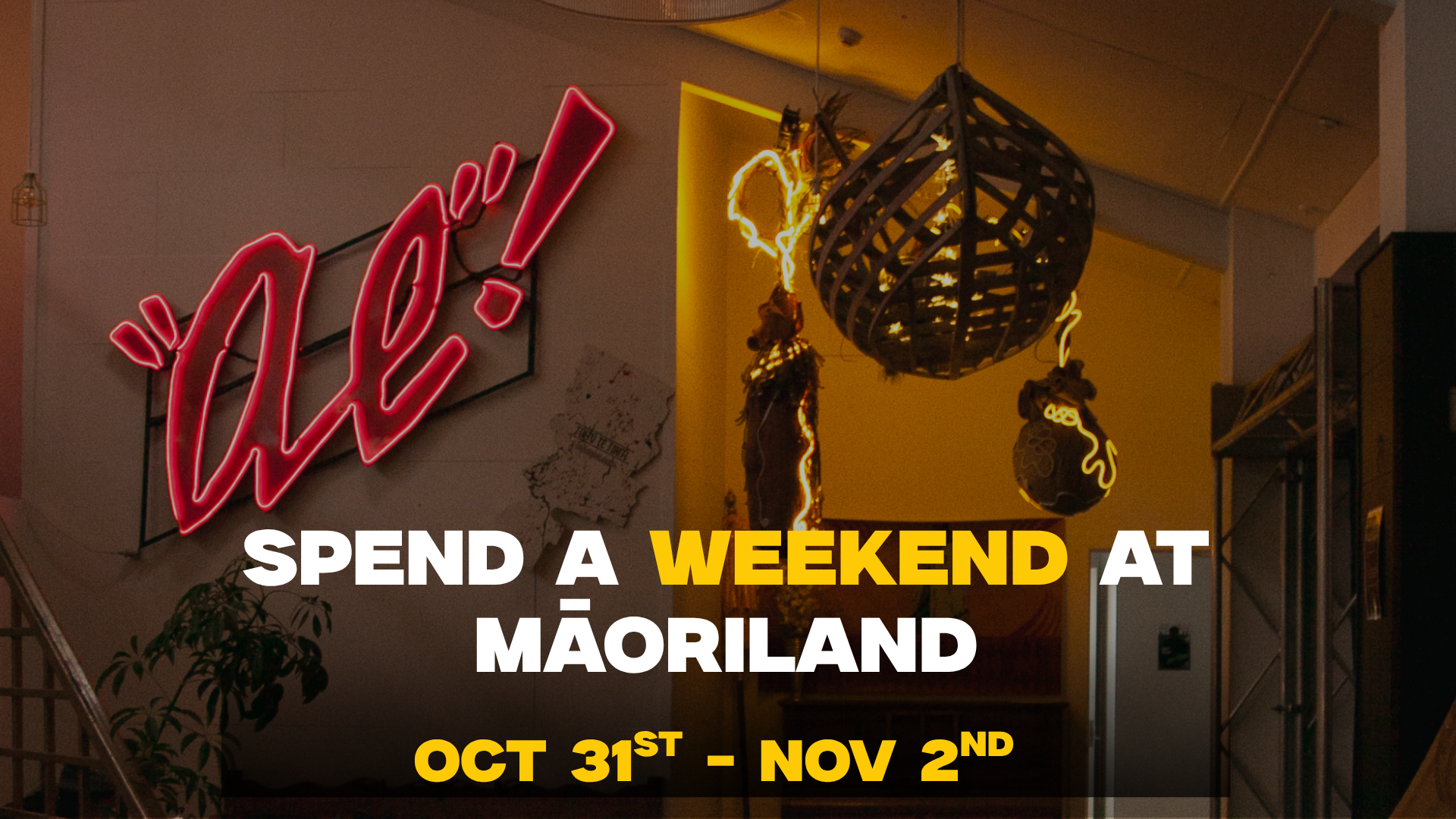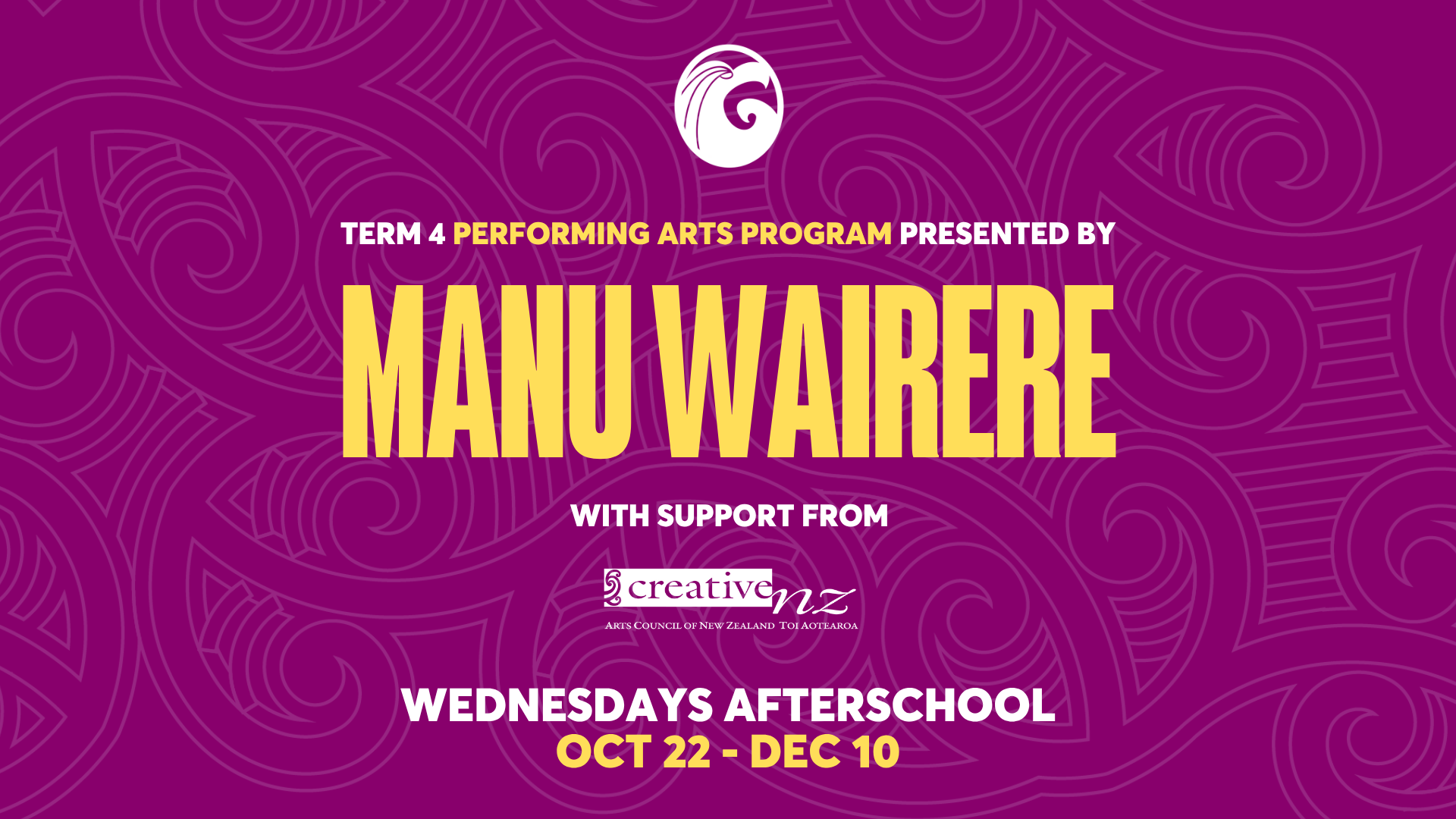MFF19 Programme Announcement |Celebrating Te Moananui a Kiwa at the 2019 Māoriland Film Festival
Announcing the programme for the largest Indigenous film festival in the southern hemisphere
The biggest Indigenous film festival in the southern hemisphere is almost here. Hosted in Ōtaki on the Kāpiti Coast, the sixth annual Māoriland Film Festival (MFF) is bringing over 138 films and 62 events from 94 Indigenous nations to Aotearoa.
The 2019 MFF programme will be released on Waitangi Day (Wednesday 6 February) and will feature a strong lineup of films from Te Moananui a Kiwa (the Pacific), including the southern hemisphere premiere of Vai.
Made by the producers of the critically acclaimed ‘Waru’, ‘Vai’ is a portmanteau feature film directed by eight female Pacific Island filmmakers and filmed in seven Pacific countries: Fiji, Tonga, Solomon Islands, Kuki Aīrani (Cook Islands), Samoa, Niue and Aotearoa (New Zealand).
Another seven Pacific features and 41 short films from Aotearoa, Hawai’i, Papua New Guinea, Rapanui, Guam, Haida Gwaii, Vanuatu and more are scheduled in the 2019 programme, including the southern hemisphere premieres of Moananuiākea: One Ocean. One Canoe. One People and SGaawaay K’uuna (Edge of the Knife).
Moananuiākea: One Ocean. One Canoe. One People celebrates the epic voyage of the Hōkūle’a around the globe. Launched in 1976, the Hōkūle’a has travelled over 470,000 nautical miles to 85 ports and 26 nations, connecting countless individuals and communities around the globe.
Sgaawaay K’uuna makes history as the first feature film in the Haida language. Nearly lost to the terrible consequences of smallpox, residential schools, church and government intervention, there are currently less than 60 fluent speakers of Haida, many over the age of 70. Made to be a catalyst for language revitalisation and economic development, it tells the classic Haida story of the traumatised and stranded man transformed to Gaagiixiid, the wildman.
Filmed on stunning Haida Gwaii, Gwaai Edenshaw and Helen Haig-Brown’s 19th-century epic is a nod to the grand storytelling traditions that lure us to the big screen.
Māoriland Film Festival Director Libby Hakaraia says, “Indigenous stories help us make sense of our world, of our connections and our shared humanity. Our sixth festival includes stories from the polar regions, from the deserts, from the mountains of Iran and Nepal, and from nations who dwell upon and beside the planet’s vast oceans including the Pacific.
Indigenous films from the United States, Canada, Northern Europe, Iran and more will feature over the five-day festival as Indigenous cinema gains more recognition and wins more awards at some of the world’s largest film festivals.
Over 50 per cent of programmed directors are female, celebrating a diversity that Hollywood is often criticised for its lack of.
With many of these filmmakers planning to travel to Ōtaki to present their films, festival attendees will have the unique opportunity to meet and mingle with the storytellers and hear about their experiences directly.
The Māoriland Rangatahi Film Festival (MRFF) also promises to again be a major drawcard for schools in the lower North Island presenting films created by young people from around the world.
Programmed by youth for their peers these films give the filmmakers of tomorrow the chance to express their experiences and identities through the medium of film, and encourages them to engage with, challenge and reflect the issues in their day-to-day lives.
The MFF is now the largest public event on the Kāpiti Coast annually, hosting over 12,000 visitors in 2018 and providing $1.3 million into the local economy.
The Māoriland Film Festival takes place between 20 – 24 March and features over 138 films and 62 events from 94 Indigenous nations from across the globe – ranging from the Sámi people of Northern Europe through to First Nations and Native Americans of North America, Te Moananui a Kiwa (the Pacific), South East Asia, the Aboriginal people of Australia and the tangata whenua of Aotearoa.
Māoriland Film Festival Key Facts & Figures:
- 62 Events to be held over five days.
- 21 feature films and 117 short films with filmmakers from 19 countries and 94 Indigenous nations – 138 films in total.
- 37 New Zealand films
- 18 New Zealand premieres of international films including 8 Southern Hemisphere premieres.
- 50% of programmed filmmakers identify as women.
- MFF2018 was attended by 12,000 visitors contributing over $1.3 million to Ōtaki and the wider Kāpiti Coast economy.
MFF2019 Complete List of Titles:
Southern Hemisphere Premieres of international Indigenous feature films
- Anori (Greenlandic/Kalaallit Nunaat) directed by Pipaluk Kreutzmann Jørgensen
- Dawnland directed by Adam Mazo, produced by Bruce Duthu (Houma), executive produced by Heather Rae (Cherokee), Impact Produced by Tracy Rector (Choctaw/Seminole)
- Haka Puai Te Kainga (Eating Up Easter) (Rapanui) directed by Sergio M. Rapu
- Trouble in the Garden (Nehiyaw (Great Plains Cree)) directed by Roz Owen, executive produced by Raven Sinclair
- Moananuiākea: One Ocean. One Canoe. One People. (Kanaka Maoli) directed by Na’alehu Anthony
- Ohiyesa: The Soul of an Indian (Flandreau Santee Sioux) directed by Sydney Beane, John Whitehead, Jesse Heinzen
- SGaawaay K’uuna (Edge of The Knife) (Haida ) directed by Gwaai Edenshaw, Helen Haig-Brown
- Vai (Fiji, Tonga, Solomon Islands, Samoa, Kuki Aīrani, Niue, Māori), directed by Nicole Whippy, ‘Ofa-Ki-Levuka Guttenbeil-Likiliki, Matasila Freshwater, Amberley Jo Aumua, Mīria George, Marina Alofagia McCartney, Dianna Fuemana, Becs Arahanga
Aotearoa Premieres of of international Indigenous feature films
- Aliko & Ambai (Arufa Village, Bena Jenno Kanagio – Koiken, East Sepik) directed by Mark Eby, Diane Anton
- Angelique’s Isle (Anishinaabe) directed by Michelle Derosier and Marie-Hélène Cousineau
- Akornatsinniittut – Tarratta Nunaanni (Among us – In The Land Of Our Shadows) (Inuit) directed by Marc Fussing Rosbach
- Black Divaz (Wonnarua Clan group) directed by Adrian Russell Wills
- Connection to Country (Ngarluma) directed by Tyson Mowarin
- Iglu: Angirraq (House:Home) (Inuit) Mosha Folger
- In My Own Words (Indigenous Australia) directed by Erica Glynn
- Tia and Piujuq (Inuit) directed by Lucy Tulugarjuk
- Toyon Kyyl (Sakha) directed by Eduard Novikov
- Voice From The Desert (Anangu), directed by Amy Pysden, Daniel Clarke, produced by Zaachariaha Fielding
By Country:
Aotearoa
- Banabans of Rabi (Niue, Banaban, Gilbertese)directed by Blessen Tom, Hele Ikimotu
- Cosmic Adventures (Samoan / Māori) directed by Bailey Poching
- Fan Girl (Samoa) directed by Mario Faumui
- He Oranga Pumau (Ngāpuhi, Ngāi Tahu) directed by Tanya Filia, Jessie McVeagh
- I Am Waru (Ngāti Porou) directed by Angela Cudd-Wharehinga
- Island Fu (Rarotonga) directed by Maya Solomon, Paeone Thatcher
- Kōwhai (Ngā Puhi, Ngāti Hāmoa) directed by Aydriannah Tuiali’i
- Merata: How Mum Decolonised the Screen (Ngāti Pikiao, Ngāi Te Rangi), directed by Heperi Mita
- My Brother Mitchell (Ngāti Awa, Te Arawa, Ngāti Ruapani, Ngāti Ranginui, Ngai Te Rangi) directed by Todd Karehana
- My Friend Michael Jones (Samoa), directed by Ian Leaupepe and Samson “Rambo”
- Rock, Paper, Scissors, Miracle? (Rarotonga) directed by Astarlli Taokia & Jette Johnson
- The Crossroads: Le Māgafā (Samoa) directed by Sani Sagala
- The Grave Digger of Kapu (Ngāti Kapu, Ngāti Raukawa ki te Tonga) directed by Libby Hakaraia
- The Messiah (Samoa) directed by Vela Manusaute
- The Note (Aitutaki) directed by Andrea George
- Uapōifalemalu (Samoa) directed by Brown Paper Ink, Crooked Fence Films
- Who We Are (Rarotonga) directed by Callia Newnham (Through Our Lens)
Australia
- Fly Peewee, Fly! (Wiradjuri) directed by Sally Riley
- No Way To Forget (Gunditjmara) directed by Richard Frankland
- Payback (Kaytej) directed by Warwick Thornton
- Round Up (Bulgunwarra, Ngāruahine) directed by Rima Tamou
- Saturday Night, Sunday Morning (Bulgunwarra, Ngāruahine) directed by Rima Tamou
- Two Bob Mermaid (Dunghutti) directed by Darlene Johnson
- Undiscovered Country (Ngarluma) directed by Tyson Mowarin
- Walter’s Ghost (Indigenous Australia) directed by Caden Pearson
Canada
- A World Of Our Own (Ojibwe) directed by Morningstar Derosier
- Aaahhh!!! Flipping Dinosaurs & Floppy Fish! (Temagami First Nation (Bear Island)) directed by Alysha
- Biidaaban: The Dawn Comes (Michif) directed by Amanda Strong
- Fast Horse (Cree) directed by Alexandra Lazarowich
- First Impressions (Peters First Nation, Sto:lo) directed by Andrew Genaille
- Heads Up (Algonquin) directed by Abraham Cote
- Heels to Heal (First Nations) directed by Eileen Francis
- Her Water Drum (Tuscarora (Haudenosaunee)) directed by Jonathan Elliott
- Idle No More (Algonquin) directed by Ginger Cote
- In The Valley Of Wild Horses (Cree, Iroquois, Carrier and Tsilhqot’in) directed by Asia Youngman and Trevor Mack
- Ka Ussi – Tsishkutamashuht (Les Debutants) (Innue) directed by Rachel, Béatrice, Gisèle Mark
- Kuujjuaq (Inuit) directed by Sammy Gadbois
- Leave It On the Water (Penelakut Tribe) directed by Steve Sxwithultxw
- Les Vaillants (Anishinaabe) directed by Martin Gunn
- Mahiganiec (Petite Louve) (Inuit) directed by Jacqueline Michel
- OChiSkwaCho (Cree) directed by Jules Koostachin
- Out of Nothing (Cree) directed by Alexandra Lazarowich and Janna Kyllästinen
- Protect Our Future Daughters (Mi’gmaq) directed by Maryanne Junta, Helena Lewis
- Remediation (Haida/Nisga’a) directed by Luke Parnell
- Run As One – The Journey of the Front Runners (Wolastoqey from Tobique First Nation) directed by Erica Daniels
- Sacred By Nature (Siksika Blackfoot) directed by Trevor Solway
- Silent Film (Mohawk) directed by Hunter Cyr Montour, Wyatt Harper, Dylan Standup
- Spirit (Muskeg Lake Cree Nation – Plains Cree) directed by Tristin Greyness
- The Amautalik (Inuit) directed by Neil Christopher
- The Importance of Dreaming (Wolastoqey from Tobique First Nation) directed by Tara Audibert
- The National Interest (Peters First Nation, Sto:lo) directed by Andrew Genaille
- The Story of Pasha (Inuk) directed by Pasha Partridge
- Ukaliq and Kalla Go Fishing (Inuit) directed by Nadia Mike
- Waaseyaa (Garden Village, Nipissing First Nation, Ojibwe, Bear Clan) directed by Evelyn Pakinewatik
- We’ll Always Have Toynbee (Mohawk) directed by Sonia B. Boileau
- Within The Stars (Oglala Lakota / Diné directed by Razelle Benally
- Ya’ma’yetha (The Hunter) (Nakoda) directed by Cameron Kootenay, Daryl Kootenay
Finland
- Eatnanvuloš lottit – Maan sisällä linnut (Birds in the Earth) ( Sámi) directed by Marja Helander
- Gobmemáinnas (Sápmi) directed by Niki Rasmus
- Salbma (Hymn) ( Sámi) directed by Katja Gauriloff
- You & Me (Utsjoki,Sápmi) directed by Lada Suomenrinne
Germany
- Reclamation (Teques/Caribe) directed by Viveka Frost
Greenland
- Greenland Timelapses | Qeqertarsuaq (Greenlandic Inuk) directed by Ulannaq Ingemann
Guam
- i Hinanao-ta (Our Journey) (Chamoru) directed by Cara Flores
Hawai’i
- Hae Hawai’i (Native Hawaiian) directed by Ty Sanga
- Last Taxi Dance (Kanaka Maoli) directed by Brayden Yoder
- Leitis In Waiting (Kanaka Maoli, Tonga) directed by Hinaleimoana Wong-Kalu, Dean Hamer, Joe Wilson
- Mauka to Makai (Kanaka Maoli) directed by Jonah Okano, Alika Maikau
- Praise Song for Oceania (Kanaka Maoli) directed by Justyn Ah Chong
- Ka Mahina a Me Ka Po (The Moon and The Night) (Kanaka Maoli) directed by Erin Lau
- Down on the Sidewalk in Waikiki (Kanaka Maoli) directed by Justyn Ah-Chong
India
- Niyamgiri – The Mountain of Law (Kondh Tribe, Odisha, India directed by Surya Shankar Dash
Iran
- Taghi (Revolt) (Iran) directed by Kooroosh Asgari
- The Hunt (Bushehr-Iran) directed by Masoud Kazerouni
- Are You Volleyball?! (Iran) directed by Mohammad Bakhshi
- Balance (Iran, Kurdistan, Kobani, Shangal) directed by Barzan Rostami
Mexico
- Hant Quij Coipaxi Hac – The Creation of the World (Comcáac (Seri), Metis) directed by Antonio Coello
- How Did The Rabbit Get To The Moon (Huastec) directed by Gabriela Badillo
- The Sorcerer’s Cricket (Yaqui) directed by Gabriela Badillo
Nepal
- Phulsiri (Gurung) directed by Ngima Gelu Lama
Norway
- Boom Boom ( Sámi) directed by Per-Josef Idivuoma
- Solas Datter (Daughter of the Sun) ( Sámi) directed by Sara Margrethe Oskal
Sweden
- Home (Inuit, Greenlandic) directed by Inuk Jørgensen
- Matej (Ngāti Ranginui, Ngāi Te Rangi, Ngāti Awa, Te Arawa and Ngāti Ruapani) directed by Julian Karehana
Swaziland
- Emkhatsini (Between) (Ngāti Pareraukawa / Ngāti Huia) directed by Toa Stappard
United States of America
- Believer (Ponca/Ojibwe) directed by Migizi Pensoneau
- Black Mountain Boy (Diné/Navajo) directed by Jonathon Yellowhair
- dukʷibəɫ swatixʷtəd (Changer’s Land) (Choctaw) directed by Tracy Rector
- Fainting Spells (Ho-Chunk Nation) directed by Sky Hopinka
- First Medicine; The long Man (Cherokee Nation) directed by Joseph Erb
- Gʷidəq (Geoduck) (Choctaw) directed by Tracy Rector
- Hooghan (Navajo) directed by Blackhorse Lowe
- Light (Cherokee) directed by Sarah Hennigan
- Shell No (Choctaw) directed by Tracy Rector
- The Man They Call Fuel (Choctaw, Cherokee) directed by Zach Litwack, produced by Colleen Thurston, Jennifer Loren
- The Violence of a Civilisation without Secrets (Ojibway) directed by Adam Khalil, Zack Khalil, Jackson Polys
- Walk In Beauty (Diné, Mandan Hidatsa, Tsimshian) directed by Forrest Goodluck
- Your Name Isn’t English (Nüümü (paiute) , Dinè (Navajo), Apache) directed by Tazbah Rose Chavez
Vanuatu
- Tulalip and Gaua – Merelava Women’s Shellfish Project (Ni-Vanuatu) directed by Georgina Kaitiplel
+ the NATIVE Slam IV and E Tū Whānau Rangatahi Film Challenge (Titles yet to be announced)
VR Films at MFF2019
- Awavena (Yawanawa), directed by Lynette Wallworth, produced by Tashka Yawanawa, Laura Yawanawa
- Biidaaban: First Light (Anishinaabe), directed by Lisa Jackson
- Thalu (Ngarluma), directed by Tyson Mowarin
- NZ Wars: The Stories of Ruapekapeka (Ngāpuhi), created by Mihingarangi Forbes
About Māoriland Film Festival: Now in its sixth year, Māoriland Film Festival (MFF) is the largest international Indigenous film festival in the Southern Hemisphere. Each March, MFF welcomes Indigenous filmmakers from around the world to Ōtaki to celebrate Indigenous creativity and storytelling in film. For more information visit: https://maorilandfilm.co.nz/
Contact
Madeleine de Young
Māoriland Film Festival Co-ordinator
021 120 7615


